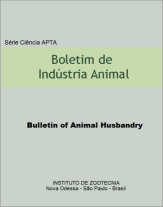Freezing changes qualitative parameters of poultry meat intend for laboratory tests
Keywords:
chicken breast, low temperature, storageAbstract
Freezing has been widely used as the safest and most economical preservation method for poultry meat because on the frozen meat the microbial activity is paralyzed, the enzymatic and the speed of chemical reactions are substantially reduced. So, the aim of this current study was to analyze the efficiency of different methods of freezing over the maintenance of quality of frozen meat when it is compared to in natura meat intend for laboratory tests. It was used 50 Pectoralis major muscles from deboned chicken breasts, which was submitted to four different methods of freezing (domestic freezer, freezer -20°C, freezer -70°C and liquid nitrogen). The samples were previously weighed, individually packed in vacuum or with aluminum foil (in the case of the samples that would be frozen with liquid nitrogen) and storage in low temperature for 30 days. The samples frozen with liquid nitrogen were kept on freezer -20ºC after fast freezing. The following parameters were analyzed: water holding capacity (WHC), cooking weight loss (CWL) and shear force (SF). The WHC was evaluated using the compression method and its determination was given by the difference between the initial weight and the final weight. The CWL was determined in samples of deboned muscles packed in plastic bags and cooked in water bath (85ºC) for 30 minutes. The CWL determination was given by the difference between the initial weight and the final weight, expressed in grams. To determine the shear force were used the samples from the CWL analysis that have been cut in subsamples with approximately 1 cm in width and analyzed with the Texture Analyzer TA-XT2i coupled to the device Warner-Bratzler and the results were expressed in Kgf cm2. The parameters were evaluated before and after the freezing for 30 days. It was used a completely randomized design with 5 treatments (without freezing €“ control group, domestic freezer, freezer -20°C, freezer -70°C and liquid nitrogen) done in 10 replications. All the freezing methods evaluated reduces (P<0.05) the WHC and SF. The CWL was not affected by freezing. Regardless of freezing method used the meat quality is affected by storage. So, it suggests that all the tests to evaluate the poultry meat quality must be made with in natura meat.Downloads
Downloads
Published
Issue
Section
License
Os autores não serão remunerados pela publicação de trabalhos, pois devem abrir mão de seus direitos autorais em favor deste periódico. Por outro lado, os autores ficam autorizados a publicar seus artigos, simultaneamente, em repositórios da instituição de sua origem, desde que citada a fonte da publicação original seja Boletim de Indústria Animal. A revista se reserva o direito de efetuar, nos originais, alterações de ordem normativa, ortográfica e gramatical, com vistas a manter o padrão culto da língua e a credibilidade do veículo. Respeitará, no entanto, o estilo de escrever dos autores. Alterações, correções ou sugestões de ordem conceitual serão encaminhadas aos autores, quando necessário. Nesses casos, os artigos, depois de adequados, deverão ser submetidos a nova apreciação. As opiniões emitidas pelos autores dos artigos são de sua exclusiva responsabilidade. Todo o conteúdo deste periódico, exceto onde está identificado, está licenciado sob a Licença Creative Commons Attribution (CC-BY-NC). A condição BY implica que os licenciados podem copiar, distribuir, exibir e executar a obra e fazer trabalhos derivados com base em que só se dão o autor ou licenciante os créditos na forma especificada por estes. A cláusula NC significa que os licenciados podem copiar, distribuir, exibir e executar a obra e fazer trabalhos derivados com base apenas para fins não comerciais.













